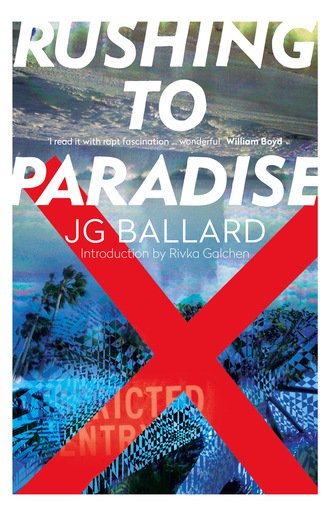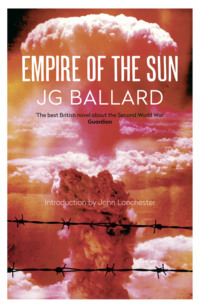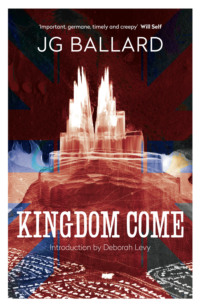
Полная версия
Rushing to Paradise
‘Neil, get ready to start the film. I can smell the French …’
Neil slipped the camera from its waterproof case. Kimo had cut the engine, and they rolled with the waves towards the shore, where the palms formed a dense palisade above a beach of black volcanic ash. Dr Barbara threw aside her weather-jacket and stood legs apart in the bows, shoulders squared and blonde hair flying like a battle-standard on the wind.
As always, Neil enjoyed filming her in close-up. Through the viewfinder he could see the exposure sores on her face, and her left nipple extruding itself through the wet cotton of her shirt, an eye-catcher for the television news bulletins or the covers of Quick and Paris-Match. He steadied himself against the float as an overtaking wave eased them from its back, and zoomed in on Dr Barbara’s high nose and determined mouth, wondering if she had been plain or beautiful as a medical student in Edinburgh twenty years earlier.
‘Take lots of film of the island,’ she told him, now directing the documentary of which she was already star and scriptwriter. ‘And get as many birds as you can.’
‘There are no albatross. Only these boobies.’
‘Just film the birds – any birds. Good God …!’
Neil sucked his numbed fingers and fumbled with the miniaturized controls of the Japanese camera. He had been working as a part-time projectionist at the film school of the University of Hawaii when Dr Barbara recruited him, and despite everything he said to the contrary she instantly convinced herself that he was a skilled cine-photographer. Fortunately the camera refocused itself, and he began to film a panorama of Saint-Esprit. The atoll was a chain of sand-bars and coral islets, the rim of a submerged volcanic crater that enclosed a lagoon five miles in diameter. The largest of the islands lay to the south-west of the lagoon, a crescent of dense forest and overgrown plantations dominated by a rocky mass that rose to a summit four hundred feet above the beach.
Searching for the threatened sea-birds, the great ocean-wanderers, Neil panned across the cliffs. The fluted cornices of blue lava together resembled the corpse of a mountain dead for millennia, propped into the sky like a cadaver sitting in an open grave. A tenacious vegetation clung to the exposed chimneys, living wreaths feasting on a set of aerial tombs. No albatross had yet appeared, but a steel tower stood on the summit, its cables slanting through the forest canopy.
The slender lattice was too frail to bear the weight of a nuclear device, and Neil assumed that it was an old radio mast. As they rode the last waves towards the beach he fixed the camera lens on the tower, hoping that its rigid vertical would restrain his stomach before it could climb into his throat. Thinking of the newsreels of atomic tests, he imagined a bomb detonated at its apex, releasing a ball of plasma hotter than the sun. For all Dr Barbara’s passion for the albatross, the nuclear testing-ground had a stronger claim on his imagination. No bomb had ever exploded on Saint-Esprit, but the atoll, like Eniwetok, Mururoa and Bikini, was a demonstration model of Armageddon, a dream of war and death that lay beyond the reach of any moratorium.
The stern of the inflatable rose as the last breaker swept them towards the beach. Neil stowed the megaphone and camera in the satchel and sealed the waterproof tapes, bracing himself against the centre bench. Dr Barbara crouched like a commando in the bows, fists gripping the mooring line. Two-bladed oar in his huge hands, Kimo stood astride the engine, holding the craft on the curved shoulders of the wave. The rolling wall crumbled in a white rush that hurled the inflatable onto its side and sent the oar windmilling through the spray.
Bludgeoned by the violent surf, they swam through the waist-deep water as the craft broke free from the sea and slewed across the sand. Carrying the satchel over his head, Neil forced himself against the undertow and waded through the slurred foam. Kimo dragged the inflatable onto the narrow shelf below the palms, and calmed the trembling rubber hull with his massive arms. Dr Barbara retrieved the oar, but a wave struck her thighs, knocking her from her feet. She fell to her knees in the seething water, stood up with her shirt around her waist and seized Neil’s hands when he pulled her onto the beach.
‘Good chap … are we all here? Where’s the camera?’
‘It’s safe, Dr Barbara.’
‘Hang on to it – the world’s watching us through that little lens …’
She sat gasping on the sand beside Neil and wiped the water from her salt-roughened cheeks. Snorting the phlegm from her nostrils, she stared back at the sea, openly admiring its aggression. Still breathless, Neil leaned against the coarse sand. After the three-week voyage, the endless yawing and rolling deck, the sheer immobility of the island made him giddy. The black ash was covered with coconut husks, yellowing palm fronds, spurs of pallid driftwood and the shells of rotting crabs. Over everything hung the stench of dead fish. The sun had vanished behind the forest canopy and a cold spray enveloped the island. A few feet away, through the trees behind them, was an insect realm of high-pitched chittering, dank mist and over-ripe vegetation.
‘Right … time to move on.’ Dr Barbara stood up and shook the water from her shirt. ‘Kimo, it’s up to you to get us out again.’
‘We’ll make it, doctor. I’ll fool the sea for you.’ As the foam surged around his feet Kimo worked on the outboard motor, clearing the sand from the air intakes. ‘We’ll wait for high tide, two hours from now.’
‘Two hours? I hope that’s enough. The French may be having lunch … Now, where’s Neil?’
Neil touched her ankle. ‘Still here, Dr Barbara, I think …’
Dr Barbara squatted beside him, buttoning her shirt from his queasy gaze. ‘Of course you’re here. Don’t lose heart, Neil. I need you now – you’re the only one who can work the camera.’
She brushed the damp hair from his eyes and ran her hand over his muscular arms, as if reminding herself that he was still the pugnacious and lazy youth she had met one evening in Waikiki, dreaming of atomic islands and marathon swims. During the voyage from Papeete she had spared him from the more arduous tasks, leaving Kimo to shift the heavy sails and work the bilge pump, and Neil sensed that he was being saved for a more exacting role than that of expedition cameraman.
‘How long do we stay on Saint-Esprit?’ he asked.
‘Long enough to make the film. We can’t help the albatross yet, but we can show people what’s happening here.’
‘Doctor …’ Neil gestured at the deserted beach and the clouds of mosquitoes. ‘Nothing’s happening.’
‘Neil!’ Dr Barbara forced him to sit up. ‘Send some sort of current through that brain of yours. We’ve almost reached the year 2000 – let’s make sure the planet’s waiting for us when we get there.’
‘That’s why I came,’ Neil assured her. ‘I want to save the albatross, Dr Barbara.’
‘I know you do. I wish there were more young men like you. We’ve got to protect everything here, not just the albatross but every palm and vine and blade of grass.’ She waved away the mosquitoes that hovered over Neil’s lips. ‘We’ll even save the mosquito!’
Needless to say, she had forgotten to pack any repellent. Himself the son of a doctor, a London radiologist who had died three years earlier, Neil again wondered if Dr Barbara was a real physician. Through her damp shirt he could see the tattered underwear held together by safety pins, and the zip of her trousers tied into place with fuse wire. He followed her to the inflatable, which Kimo had readied for departure, its bows facing the sea. She sat on the rubber float, a worn hand touching the outboard, and stared in a bleak way at the waves. For all her calls to action, she seemed disoriented by the size of the atoll.
She rallied when Neil raised the camera and began to film her. A low cloud ceiling extended to the horizon, below which lay a grey, marbled air, the perfect film-light. Despite her ragged clothes, the sores on her lips and fraying hair, the camera lens instantly restored Dr Barbara’s confidence in herself. As always, Neil found himself drawn to this eccentric woman, and determined at whatever cost to protect her from reality.
Escorted by the mosquitoes, they set out to locate the airstrip, and followed the narrow beach under the overhang of palms. Kimo took the lead, machete in hand, pausing without comment whenever Dr Barbara stopped to rest. Waiting for her, Neil was aware of the radio mast high above the island, its antennae trailing them through the breaks in the forest canopy. A concrete blockhouse sat in a grove of tamarinds, a forgotten totem of the nuclear age that seemed more ancient than any Easter Island statue.
Rainwater leaked down the hillside, seeping between the moss-covered trees. After hiding among the ferns, a small stream fanned into a delta of silk-smooth ash and vented itself into the sea.
Neil bathed his feet in the cool shallows, the first fresh water he had felt on his skin since leaving Papeete. Dr Barbara knelt beside him and washed her arms and face. From a hip pocket she took a leather make-up pouch and combed her hair into damp waves. Dissatisfied with herself, she grimaced into the mirror and sucked the sores on her lips.
‘Not very good, but never mind.’
‘You look fine.’ Neil spoke sincerely, intrigued by the way in which this often scruffy middle-aged woman hovered on the edge of glamour. ‘Everyone will be impressed.’
‘You’re impressed, Neil. But that’s not what I meant. I want everyone to see how serious we are.’
‘You are serious.’ Tempted to tease, he added: ‘I’ll film you from your best side.’
‘Have I got a best side? What a dreadful thought.’
Neil filmed her as she followed Kimo through the forest, feet sinking into the spongy ground. The Hawaiian slashed at the ferns, exposing the rusty steel sections of a small-gauge railway. Everywhere lay the debris of Saint-Esprit’s earlier occupations. Wooden huts leaned on their worm-riddled stilts, roofs open to the sky, hibiscus and morning glory flowering between the floorboards. A prayer-shack of corrugated iron stood on a headland above the lagoon, surrounded by the graves of an overgrown cemetery laid out by the Catholic missionaries. The forest had long since reclaimed the modest farm plots. Breadfruit trees, jack and eucalyptus crowded together among the taro plants, wild yams and sweet potatoes.
Imposed on this smothered realm was the refuse left by the French engineers, a moraine of abandoned military equipment. Kimo rested on an empty fuel tank beside the railway line, hacking at the lianas that snared it to the ground. Cloudy wine bottles lay in a wooden crate at his feet, surrounded by truck tyres and coils of telephone wire. A second camera-tower stood among the deep ferns, its window-slits staring at nothing.
They crossed a drainage ditch and stepped through the screen of palms. The airstrip swept past them, freshly surfaced with pulverized coral, its eerie geometry forming the outlines of an immense white altar among the trees. A camouflaged radio-cabin stood in the undergrowth fifty yards from them, aerials pointing to the empty sky. At its southern limit the airstrip ended in a barrier of dunes, where an army bulldozer sat with its scoop sunk in the sand.
Swinging the machete in his hand, Kimo walked to the bulldozer and tapped its metal tracks. An empty beer can rested on the driver’s seat. Head raised, he stood stiffly in the strong wind as the sunlight flashed on the machete’s blade. Lost in some reverie of his Hawaiian kingdom, he at last turned and gave a dismissive wave, like a travel courier warning a party of visitors from an uninteresting site.
‘What is it, Kimo?’ Dr Barbara called. ‘Can you see anything?’
‘Albatross, doctor … just albatross.’
‘Albatross …?’ Dr Barbara seized Neil’s arm and hurried him across the runway. ‘Neil, the birds are still here! Get the camera ready.’
They reached the dunes and clambered up the slopes of churned sand, sinking to their knees in the black ash. Dr Barbara shielded her eyes from the wind and peered at the sky as Kimo strode down the beach to the headland beside the prayer-shack.
‘Kimo! Where are the albatross? I can’t see a single one.’
‘There are plenty, doctor.’ Kimo gestured in an offhand way at the hillocks of sand and beach-grass. ‘Every albatross you need.’
‘Kimo …?’
‘Over there.’
‘Dr Barbara …’ Neil lowered the camera, unsure whether to film her when she was caught off-guard. ‘They’re all around us. They’re not in the sky any more …’
A colony of albatross had nested among the hillocks, taking advantage of the wind that rose from the surface of the dunes. Their nests were little more than hollows in the sand, crudely lined with feathers and grass, but every one of them had been kicked apart. The heel-marks of heavy boots had stamped themselves into the rain-sodden ash. Fragments of broken shell trembled in the cool air, blurs of down quivering on their serrated edges. Dead chicks lay in the crushed grass, smeared with the yellow stomach oil that their parents had vented over them in their panic. Wings outstretched, dozens of the great birds rested at the water’s edge, clubbed to death as they tried to escape. The ruffled plumage glared against the black sand like ice-white blossoms thrown into a refuse pit.
‘Thirty-eight … nine …’
Kimo wandered among them, a stiff smile masking his face. The machete hung loosely in his hand, as if he were tired after cutting down the sky. Listening to his flat voice, Neil realized that the Hawaiian was counting the dead birds, and that in some way a finite number of fatalities would diminish the atrocity committed against the creatures.
‘Kimo …. why are they killing the birds?’
‘They need to extend the runway.’ Kimo spoke matter-of-factly. ‘On Midway the Air Force killed thirty thousand goonies last year. They get into the jet intakes.’
‘What about the French soldiers?’ Neil scanned the empty runway, as white as the feathers of the albatross. ‘They must be here somewhere.’
‘Maybe they’re bored. Killing is slow work …’
Unable to console the Hawaiian, Neil returned to Dr Barbara. She stood among the dead birds, hair floating from her forehead like threatening vapour above a volcano. As the wind stirred the plumage of the dead birds the beach seemed to shiver under her gaze. But her mouth was set in a curious grimace that was almost a smirk of satisfaction.
‘Neil, I want the world to see this. Make sure you include every bird. Especially the chicks.’
‘There are too many, doctor.’ Reluctantly, Neil raised the camera and searched for the wide-angle button. ‘They look like chrysanthemums …’
‘All of them! They deserve to be remembered. And don’t forget Kimo.’
But the Hawaiian had lost interest in the birds, and was walking towards a camera-tower that looked out over the lagoon to the detonation zone four miles away. The iron-grey cement, and the hieroglyph formed by the camera slits, reminded Neil of the gloomy bunkers that he and his father had explored at Utah Beach on the Normandy coast, remnants of the Nazi West Wall that outstared time.
At the northern end of the runway the French engineers had set up their camp. A wooden pier jutted into the lagoon, a cargo lighter moored against its landing stage. Crates filled with signals gear sat under the trees beside a storage shed, from which a set of landing lights and an aluminium water tower had been unloaded. But there was no sign of any nuclear or chemical warfare equipment. Saint-Esprit, Neil guessed with some disappointment, was no more than a refuelling stop on the air-run between Mururoa and Tahiti.
After filming Dr Barbara among the dead birds he wiped the chick entrails from his running shoes and followed her down the airstrip. She strode through the powdered coral, white dust rising at her heels, a dead albatross clasped in her arms. Her chin and forehead were streaked with blood, a warning to the sky to hold its breath. Neil had been unsettled by the fate of the huge birds, but he already realized that he was filming a well-rehearsed scene in the theatre of protest. Kimo climbed the water-tower and hung the banner from its spherical reservoir, while Dr Barbara sprayed her slogans across the green canvas roofs of the three barrack tents, slashing blades of gaudy crimson through the khaki fatigues hanging on a washing line. They posed together, native Hawaiian and English spinster, committed to their shared defence of the threatened Pacific.
Ten minutes later, as he replayed the sound-track to a critical Dr Barbara, Neil became aware that he was not the only person to film this contrived scene. A hundred yards from the airstrip, by the path that led up the hillside to the radio mast, three soldiers in French uniforms were watching the display. While his men waited beside him, smoking their cigarettes, the sergeant took a leisurely series of still photographs with his camera, like a tourist recording a quaint folkloric rite. After replacing the lens shroud, he beckoned his men forward, and together they strolled towards the airstrip.
‘They’re here! Kimo, take the camera!’ Dr Barbara snatched the video-camera from Neil’s hands and thrust it against Kimo’s chest. ‘Neil, climb the ladder and wrap the banner around your shoulders.’
‘Dr Barbara … shouldn’t we wait? The soldiers are armed.’
‘Neil, try to help me.’ Dr Barbara propelled him towards the ladder and forced his hands onto the metal rungs. For all the excitement, her eyes were calm, as if she had colluded with the French soldiers and was relieved to see them arrive. Before pushing him up the ladder she spoke rapidly to him: ‘Neil, there are millions of young people like you all over the world. They won’t listen to me but they’ll follow you.’
Kimo had dropped his machete to the ground. He knelt on the runway and, with an expertise that surprised Neil, began to film the approaching soldiers. He recorded Dr Barbara shouting into her megaphone, and ended with a close-up of an embarrassed Neil on the ladder, the banner draped across his chest.
‘Go, Kimo … now!’
Dr Barbara pulled the Hawaiian to his feet. He held her wrists, as if uncertain whether to leave, and then tore himself from her and ran across the airstrip towards the forest, camera in hand. When he reached the prayer-shack he paused among the graves, waiting for Dr Barbara to follow before plunging into the waist-deep ferns.
The French soldiers made no effort to pursue him. As Dr Barbara bellowed at them through the megaphone they put out their cigarettes, amused by this over-excited Englishwoman tripping over the dead bird at her feet. Dragging the banner with him, Neil jumped from the ladder and tried to wipe the blood from her arms.
‘Dr Barbara, let’s go. They’ll arrest us.’
‘I’m staying, Neil. I want to see this through. Kimo can show the film to the world.’
‘Doctor, the world isn’t interested …’
He was about to follow Kimo across the airstrip when the French sergeant raised his right hand. He unbuckled the flap of his holster and walked forward, pointing to Neil.
‘Arrête-toi! Ne bouge pas!’
Cursing Dr Barbara, Neil sprinted along the airstrip through the trail of bloody feathers. Kimo was running among the trees, retracing the railway line towards the beach with a lightness of foot that Neil had never suspected.
‘Kimo … wait! Kimo!’
He was still shouting at the Hawaiian when he heard the pistol shot behind him.
2
Protesting Too Much
The protest rally at the University of Hawaii campus had reached a climax, its rhetoric as inflated as the helium balloons, emblazoned with ecological slogans, that rose from their cradles beside the podium. Lying in his bed on the sixth floor of the Nimitz Memorial Hospital, Neil watched the familiar scene on his television set. He turned down the sound as the last speaker, a local basketball commentator turned eco-evangelist, began his address to the student audience.
This aggressive sermon, which Neil now knew by heart, combined religious fervour, high-flown sporting analogies and blatant threats against the French consul in Honolulu and any French tourists daring to defile the beaches of Waikiki. Buying a Citroën or an Hermès scarf was a sin equal to the destruction of ten acres of rain-forest or the murder of a hundred albatross.
The hospital was almost a mile from the rally, but through the open window Neil could hear the amplified voice reflected across the rooftops. Megaphones hectored him in his deepest dreams. Even when he pressed the sound mute on the remote control, his last defence against the protest movements, the repeated slogan ‘Save the Albatross’ seemed to drum from the loudspeaker. Every mention of the wandering albatross – no specimen of which, an amateur ornithologist in the kidney unit informed him, ever nested in the Hawaiian Islands – produced a spasm of pain in his injured foot.
‘Save the frigate bird,’ Neil muttered. ‘Save the quetzal …’
The bullet from the French sergeant’s pistol had struck the ball of his right foot, exiting between the metatarsal bones and causing what his doctors termed a partial amputation of the big toe. Six weeks later, Neil moved in a painful, one-legged hobble, a legacy of the infected muscle sheath which the Papeete paramedics had allowed to run out of control while the French authorities tried to resist the world-wide media clamour for his release.
The wound was still leaking when Neil at last flew to Honolulu. But the bloodied bandages on the television newscasts had been a propaganda coup whose impact rivalled the stigmata of a saint. A breathless Dr Barbara embraced him on his stretcher and assured the cameras that these few crimson drops redeemed the ocean of blood shed by the slaughtered birds. Had she aimed the pistol herself, Dr Barbara could not have found a more valuable target.
Even Neil’s mother and his step-father, Colonel Stamford, had been impressed by Neil’s celebrity. They flew from Atlanta to be with him during his first week at the Nimitz, and sat by his bed surrounded by the huge bouquets that endlessly arrived from well-wishers. Accepting a rose from Neil, his mother gazed at the blood-red petals as if they had been dipped into her son’s heart. Neil promised his step-father that he would join them in Atlanta as soon as he was strong enough to walk to the aircraft, but the colonel urged him to remain in Honolulu for at least a further month, perhaps seeing Neil’s fame as a therapeutic process in itself that might free the restless boy from his memories of his dead father.
A helium balloon sailed over the hospital car park, bearing the stylized image of an albatross. On the television screen the basketballing evangelist had begun his final peroration. Neil kept his thumb firmly on the sound mute, but the door of his room opened. Nurse Crawford, a keen windsurfer from Cape Town whom he had first met at a beach party in Waikiki, walked over to the set and turned up the sound.
‘… And let’s not forget someone who gave everything in the fight against ecological terrorism – Neil Dempsey, lying at this moment in the Nimitz. That French bullet he took was aimed at every one of us, at every albatross and dolphin and minke whale. We’re with you, Neil, lying right next to you in that bed of pain …’
Nurse Crawford playfully lifted Neil’s sheet, rolling her eyes as he shielded his crotch with the remote control.
‘Neil, who’s lying next to you? I just hope you haven’t given everything. We’re all waiting for a special treat.’
Neil pulled the sheet from her hands but allowed her to pinch his ribs. ‘I’ll save some for you, Carole.’
‘Hearts are bursting, Neil.’ She grimaced at the television screen. ‘Now, look who’s here. The great lady doctor, still itching to save the world. What do you think of her new hairdo?’
Neil rearranged his get-well telegrams. ‘It looks great. Dr Barbara’s all right. I like her.’









